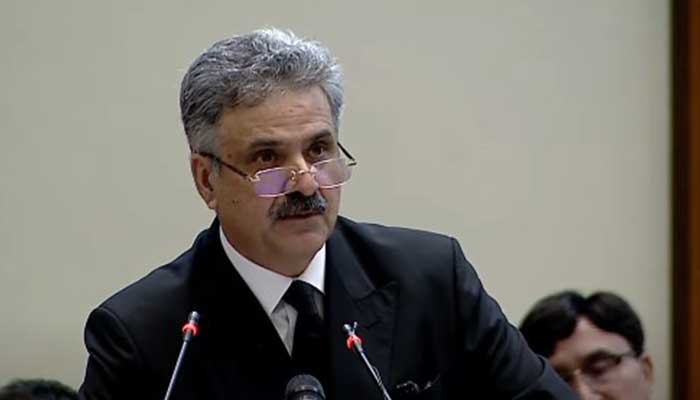
- The Supreme Judicial Council decided 64 complaints against the judges: CJP.
- He says that the case management system guarantees rapid elimination of pending cases.
- Add the NJPMC meeting on October 17 to review missing persons, key issues.
The judge of the President of the Supreme Court of Pakistan (CJP), Yahya Afridi, has announced that the Supreme Court will soon begin to program cases using artificial intelligence, but at the same time, he acknowledged that the Judiciary “is not completely ready” for immediate use.
On Monday, the Judicial Conference in Islamabad was attended, attended by Judges of the Supreme Court and the Superior Courts, the Pakistan Attorney (AGP) Mansoor Usman Awan, and representatives of the Pakistan Bar Association and the Association of Lawyers of the Supreme Court, the main judge emphasized that the new judicial year is not merely ceremonial.
“The purpose of the new judicial year ceremony is to review our performance,” he said, remembering that tradition began in the 1970s and had been regularly held since 2004.
He said that transparency in the judicial system would guarantee justice and emphasize that rapid cases of cases and technology -promoted reforms were fundamental for their vision of an efficient judiciary.
Judge Afridi said that when assuming the position, he had felt the need for reforms and initiated them in five fundamental pillars. “We prioritize technology to improve the provision of services, transparency in cases and strengthening the legal framework,” he said, added that case management systems had been introduced to guarantee the timely elimination of cases.
He announced that the Supreme Court is moving towards a paperless system. “The case registration, the case records and copies of the trials have already been made available online, and the court will work through a totally digital system,” he said. “Electronic services have been launched, and a facilitation center will become fully functional on October 1 to serve litigants.”
The president of the Supreme Court revealed that the Supreme Judicial Council (SJC) had decided 64 complaints against the judges, while 72 were under consideration and 65 cases remained pending. “The remaining cases will be distributed among the judges at the end of this month. We are following the principle of order, in order and we will not take cases from the lower part of the list,” he said.
Highlighting the importance of technology, he said: “Everyone talks about artificial technology and intelligence (IA). We are scanning 61,000 files digitally, and the project will be completed in six months. The cases will be programmed through artificial intelligence, although we are not yet completely ready for its immediate application.”
Judge Afridi said that internal audit procedures had been completed, and that draft rules had been shared with the judges to receive comments. “We have summoned a complete judicial meeting to review the rules. Members with objections must present them in writing so that they can be considered duly,” he added.
He also clarified the rules regarding the judges’ license, saying that during the judicial holidays no permission was required, although outside the holidays, the previous intimidation outside the fortuitous days was mandatory.
By discussing security measures, the president of the Supreme Court said: “Security for me and other judges has been reduced. The protocol in the red zone has been reduced. Judges may require security outside Islamabad, but not within the red zone.” He said he had reduced his security vehicles from nine to only two.
Judge Afridi emphasized that he had traveled remote areas to review the justice system and instructed that the problems of the entire Judiciary throughout the country are addressed. He announced that the National Judicial Police Committee (NJPC) would meet on October 17 to review key issues, including cases of missing persons.
The vice president of the Council of the Bar Association of Pakistan, Tahir Nasrullah, in his direction, paid tribute to the president of the Supreme Court Afridi and recognized the recent initiatives to facilitate litigants, including the provision of solar energy and solar energy facilities in remote areas and the practical use of video links hearings.
He added that pending cases in the Supreme Court had decreased and expressed hope that access to justice would improve even more at the judicial level of the district.
The president of the Supreme Court Law Association, Rauf Atta, also praised the President of the Supreme Court for presenting a new vision for the Supreme Court, citing achievements such as electronic presentation, video links hearings and the establishment of a facilitation center.
He appreciated that the court continued the hearings even during the summer holidays, although he raised concerns about the delays in cases programming and requested more steps to relieve the litigant process.
Attorney General Usman Awan, in his comments, said that the provision of justice remained the main priority of the judicial and that adhesion to the Constitution and the law ensured transparency.
He appreciated the reduction of pending cases compared to the previous year and praised the judges and officers of the Supreme Court. He also supported the use of artificial technology and intelligence to improve judicial efficiency.



